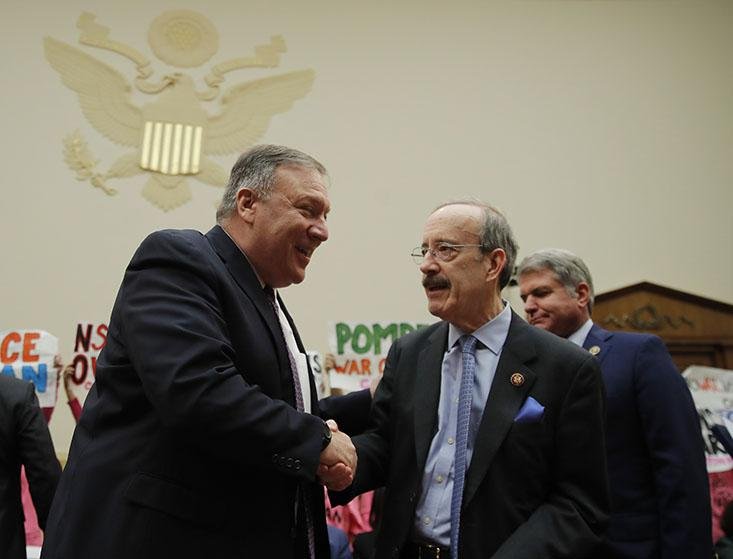WASHINGTON -- Secretary of State Mike Pompeo defended the Trump administration's response to the spreading coronavirus but also faced contentious questions from Democrats about the basis for an airstrike that killed Iran's most powerful general and whether the attack had put American security at risk.
Democrats on the House Foreign Affairs Committee repeatedly expressed frustration that the panel was afforded only two hours to question Pompeo, who until Friday had gone months without testifying publicly on Capitol Hill. Pompeo was scheduled to speak at the Conservative Political Action Conference outside Washington less than four hours after the hearing began.
"Mr. Secretary, it shouldn't have been so difficult to get you here, and your appearance here today is far too short," Democratic Rep. Eliot Engel of New York, the committee's chairman, said at the outset of the hearing.
Minutes later, Rep. Gregory Meeks, a New York Democrat, recalled Pompeo's "thundering" while in Congress about the need for testimony from one of his Democratic predecessors, Hillary Clinton, about the 2012 attacks on the American embassy in Benghazi.
"'But with you, sir, we had to move heaven and earth to get you here today for just two hours," Meeks said. "To me that shows disregard for the oversight responsibilities of the United States Congress."
Pompeo noted that he had briefed Congress more than 70 times on the administration's dealings with Iran and sought to keep his testimony focused on that subject -- the stated focus of the hearing.
He repeatedly defended the administration's January strike against Gen. Qassen Soleimani, the head of Iran's elite Quds force, saying he was "100 percent" confident that the military commander had plans to kill more Americans and was "actively plotting" to do so. The State Department had designated Soleimani as a terrorist several years ago.
"His death reduced the risk to our personnel overseas, both my diplomats and our military, and made clear that we are willing and able to impose costs on our adversaries if they threaten or attack us," Pompeo said.
Republicans defended the strike, with Rep. Adam Kinzinger of Illinois describing Soleimani as a "demon." Rep. Brian Mast of Florida challenged Democrats on the committee to say they'd have preferred that the general was alive rather than dead.
Democrats were skeptical of Pompeo's arguments, with Rep. Andy Levin of Michigan at one point showing Pompeo a blank map and asking him to pinpoint the embassies that were under threat of attack before Soleimani's death.
"I'm never willing to disclose classified information. I assume you're not either," Pompeo responded.
Pompeo also defended the administration's response to the coronavirus, saying he was "incredibly proud" of the work the State Department had done in getting American civilians and diplomats out of China, where the illness first surfaced. He also said the administration had been in touch with Iran, where new cases have been reported, and is prepared to offer medical and technical help.
"I am confident that this administration has taken actions that have significantly reduced risk, and will continue to do so," Pompeo said. Dozens of cases but no deaths have been confirmed in the United States.
A Section on 02/29/2020
